The edict by Muslim clerics that women cover their hair hinges on a lie.
It depends on Qur’anic misinterpretations of the word hijab and its variations.
The word hijab, or a derivative, appears nine times in the Qur’an.
None of those times means a head covering. None. Zero. Zilch.
Audio recordings: quran.com
Here are the nine references to the word and two additional verses that are manipulated to force women to cover their hair from Iran to Indiana. In bold are the references to the hijab usage both in Arabic and English.
If you have any contributions to this analysis, please write to me at asra@asranomani.com.
1. “Wall of separation” — Al-A'raf (7:46)
This verse speaks of an “obstacle” or “wall of separation” between those in heaven and those in hell.
وَبَيْنَهُمَا حِجَابٌۭ ۚ وَعَلَى ٱلْأَعْرَافِ رِجَالٌۭ يَعْرِفُونَ كُلًّۢا بِسِيمَىٰهُمْ ۚ وَنَادَوْا۟ أَصْحَـٰبَ ٱلْجَنَّةِ أَن سَلَـٰمٌ عَلَيْكُمْ ۚ لَمْ يَدْخُلُوهَا وَهُمْ يَطْمَعُونَ ٤٦
Transliteration:
wabaynahumā ḥijābun waʿalā l-aʿrāfi rijālun yaʿrifūna kullan bisīmāhum wanādaw aṣḥāba l-janati an salāmun ʿalaykum lam yadkhulūhā wahum yaṭmaʿūn
Discussion: The meaning of hijabun حِجَابٌۭ is a wall of separation.
Translations:
Aisha Bewley: There will be a dividing wall between them and on the ramparts there will be men who recognize everyone by their mark. They will call out to the people of the Garden: ´Peace be upon you!´ They will not enter it for all their ardent desire to do so.
The Clear Quran, Dr. Mustafa Khattab: There will be a barrier between Paradise and Hell. And on the heights ˹of that barrier˺ will be people who will recognize ˹the residents of˺ both by their appearance. They will call out to the residents of Paradise, “Peace be upon you!” They will have not yet entered Paradise, but eagerly hope to.
Sahih International: And between them will be a partition, and on [its] elevations are men who recognize all by their mark. And they call out to the companions of Paradise, "Peace be upon you." They have not [yet] entered it, but they long intensely.
2. “Barrier” and “concealed partition”— Surah Al Isra (17:45)
وَإِذَا قَرَأْتَ ٱلْقُرْءَانَ جَعَلْنَا بَيْنَكَ وَبَيْنَ ٱلَّذِينَ لَا يُؤْمِنُونَ بِٱلْـَٔاخِرَةِ حِجَابًۭامَّسْتُورًۭا
Transliteration: Wa izaa qara’ tal Quraana ja’alnaa bainaka wa bainal lazeena laa yu’minoona bil aakhirati hijaabam mastooraa.
Discussion: The meaning of hijaabam حِجَابًۭامَّ is a “hidden barrier” and “concealed partition.”
Translations:
M.Pickthall: And when thou recitest the Qur´an, we place between thee and those who believe not in the Hereafter a hidden barrier.
Sahih International: And when you recite the Qur’an, We put between you and those who do not believe in the Hereafter a concealed partition.
3. “Screen,” “seclusion” — Sūrah Maryam (19:17)
فَٱتَّخَذَتْ مِن دُونِهِمْ حِجَابًۭا فَأَرْسَلْنَآ إِلَيْهَا رُوحَنَا فَتَمَثَّلَ لَهَا بَشَرًۭا سَوِيًّۭا
Transliteration: Fattakhazat min doonihim hijaaban fa arsalnaaa ilaihaa roohanaa fatamassala lahaa basharan sawiyyaa
Discussion: The use here of hijaaban حِجَابًۭا is “a screen,” “seclusion” and “out of her people’s sight.” Two translations are “a veil” but they clearly reference a separation, not a literal hair covering.
Translations:
Sahih International: And she took, in seclusion from them, a screen. Then We sent to her Our Angel, and he represented himself to her as a well-proportioned man.
Pickthall: And had chosen seclusion from them. Then We sent unto her Our Spirit and it assumed for her the likeness of a perfect man.
Yusuf Ali: She placed a screen (to screen herself) from them; then We sent her our angel, and he appeared before her as a man in all respects.
Shakir: So she took a veil (to screen herself) from them; then We sent to her Our spirit, and there appeared to her a well-made man.
Muhammad Sarwar: out of her people's sight. We sent Our Spirit to her, who stood before her in the shape of a well formed human being.
Mohsin Khan: She placed a screen (to screen herself) from them; then We sent to her Our Ruh [angel Jibrael (Gabriel)], and he appeared before her in the form of a man in all respects.
Arberry: …and she took a veil apart from them; then We sent unto her Our Spirit that presented himself to her a man without fault.
4. “Prohibiting partition,” Al-Furqaan (25:53)
وَهُوَ ٱلَّذِى مَرَجَ ٱلْبَحْرَيْنِ هَـٰذَا عَذْبٌۭ فُرَاتٌۭ وَهَـٰذَا مِلْحٌ أُجَاجٌۭ وَجَعَلَ بَيْنَهُمَابَرْزَخًۭا وَحِجْرًۭا مَّحْجُورًۭا
Transliteration: Wa Huwal lazee marajal bahraini haazaa ‘azbun furaatunw wa haazaa milhun ujaaj; wa ja’ala bainahumaa barzakhanw wa hijran mahjooraa.
Discussion: Mahjooraa مَّحْجُورًۭا is a derivate word of hijab. Translations of the word are “prohibiting partition,” “a partition,” “insurmountable barrier,” “a barrier and a complete partition,” “forbidding ban” and “utter obstruction” or “obstruction obstructed.”
Translations:
Sahih International: And it is He who has released [simultaneously] the two seas, one fresh and sweet and one salty and bitter, and He placed between them a barrier and prohibiting partition.
Yusuf Ali: It is He Who has let free the two bodies of flowing water: One palatable and sweet, and the other salt and bitter; yet has He made a barrier between them, a partition that is forbidden to be passed.
Abul Ala Maududi: And it is He, Who has let loose the two seas, one palatable and sweet, the other bitter and saltish, and there is a partition between them, which is an insurmountable barrier.
Muhsin Khan: And it is He Who has let free the two seas (kinds of water), one palatable and sweet, and the other salt and bitter, and He has set a barrier and a complete partition between them.
Pickthall: And He it is Who hath given independence to the two seas (though they meet); one palatable, sweet, and the other saltish, bitter; and hath set a bar and a forbidding ban between them.
Dr. Ghali: And He is the One Who has merged the two seas, this one sweet, grateful (to taste), and this salt, bitter (to the tongue); and He has made between them an isthmus, and an utter obstruction. (Literally: obstruction obstructed)
Abdel Haleem: It is He who released the two bodies of flowing water, one sweet and fresh and the other salty and bitter, and put an insurmountable barrier between them.
5. “Partition” or “curtain,” Al-Ahzab (33:53)
يَـٰٓأَيُّهَا ٱلَّذِينَ ءَامَنُوا۟ لَا تَدْخُلُوا۟ بُيُوتَ ٱلنَّبِىِّ إِلَّآ أَن يُؤْذَنَ لَكُمْ إِلَىٰ طَعَامٍ غَيْرَ نَـٰظِرِينَ إِنَىٰهُ وَلَـٰكِنْ إِذَا دُعِيتُمْ فَٱدْخُلُوا۟ فَإِذَا طَعِمْتُمْ فَٱنتَشِرُوا۟ وَلَا مُسْتَـْٔنِسِينَ لِحَدِيثٍ ۚ إِنَّ ذَٰلِكُمْ كَانَ يُؤْذِى ٱلنَّبِىَّ فَيَسْتَحْىِۦ مِنكُمْ ۖ وَٱللَّهُ لَا يَسْتَحْىِۦ مِنَ ٱلْحَقِّ ۚ وَإِذَا سَأَلْتُمُوهُنَّ مَتَـٰعًۭا فَسْـَٔلُوهُنَّ مِن وَرَآءِ حِجَابٍۢ ۚ ذَٰلِكُمْ أَطْهَرُ لِقُلُوبِكُمْ وَقُلُوبِهِنَّ ۚ وَمَا كَانَ لَكُمْ أَن تُؤْذُوا۟ رَسُولَ ٱللَّهِ وَلَآ أَن تَنكِحُوٓا۟ أَزْوَٰجَهُۥ مِنۢ بَعْدِهِۦٓ أَبَدًا ۚ إِنَّ ذَٰلِكُمْ كَانَ عِندَ ٱللَّهِ عَظِيمًا ٥٣
Transliteration: Yaaa aiyuhal lazeena aamanoo laa tadkhuloo bu yootan Nabiyyi ilaaa ai yu’zana lakum ilaa ta’aamin ghaira naazireena inaahu wa laakin izaa du’eetum fadkhuloo fa izaa ta’imtum fantashiroo wa laa mustaaniseena lihadees; inna zaalikum kaana yu’zin Nabiyya fa yastahyee minkum wallaahu laa yastahyee minal haqq; wa izaa sa altumoohunna mataa’an fas’aloohunna minw waraaa’i hijaab; zaalikum atharu liquloobikum wa quloobihinn; wa maa kaana lakum an tu’zoo Rasoolal laahi wa laaa an tankihooo azwaajahoo mim ba’diheee abadaa; inna zaalikum kaana ‘indal laahi ‘azeema
Discussion: During the fifth year of the prophet Muhammad’s migration, or hijra, to Medina, when some wedding guests overstayed their welcome at the prophet’s home. It established some rules of etiquette for speaking to the wives of prophet Muhammad.
Hijab حِجَابٍۢ here meant a partition or curtain.
Sahih International: O you who have believed, do not enter the houses of the Prophet except when you are permitted for a meal, without awaiting its readiness. But when you are invited, then enter; and when you have eaten, disperse without seeking to remain for conversation. Indeed, that [behavior] was troubling the Prophet, and he is shy of [dismissing] you. But Allah is not shy of the truth. And when you ask [his wives] for something, ask them from behind a partition. That is purer for your hearts and their hearts. And it is not [conceivable or lawful] for you to harm the Messenger of Allah or to marry his wives after him, ever. Indeed, that would be in the sight of Allah an enormity.
6. “Hidden” or “darkness” (38:32) — Surat Şād (The Letter)
فَقَالَ إِنِّىٓ أَحْبَبْتُ حُبَّ ٱلْخَيْرِ عَن ذِكْرِ رَبِّى حَتَّىٰ تَوَارَتْ بِٱلْحِجَابِ ٣٢
Transliteration: Faqala innee ahbabtu hubba alkhayri AAan thikri rabbee hatta tawarat bialhijab.
Discussion: The meaning of hijab حِجَابِ is not a hair covering. It means a curtain.
Sahih International: And he said, "Indeed, I gave preference to the love of good [things] over the remembrance of my Lord until the sun disappeared into the curtain [of darkness]."
Pickthall: "And he said: Lo! I have preferred the good things (of the world) to the remembrance of my Lord; till they were taken out of sight behind the curtain.
7. “Partition” (41:5)
وَقَالُوا۟ قُلُوبُنَا فِىٓ أَكِنَّةٍۢ مِّمَّا تَدْعُونَآ إِلَيْهِ وَفِىٓ ءَاذَانِنَا وَقْرٌۭ وَمِنۢ بَيْنِنَا وَبَيْنِكَ حِجَابٌۭ فَٱعْمَلْ إِنَّنَا عَـٰمِلُونَ ٥
Transliteration: Waqaloo quloobuna fee akinnatin mimma tadAAoona ilayhi wafee athaninawaqrun wamin baynina wabaynika hijabun faiAAmal innana AAamiloona
Discussion: In this Qur’anic verse, hijabun حِجَابٌۭ never means an act of piety. Instead, it’s got a negative connotation, noting in this verse “our hearts are under hijab.”
Translation:
Sahih International: And they say, "Our hearts are within coverings from that to which you invite us, and in our ears is deafness, and between us and you is a partition, so work; indeed, we are working."
8. “Wall of separation” — Sarah ash-Shura (42:51)
۞ وَمَا كَانَ لِبَشَرٍ أَن يُكَلِّمَهُ ٱللَّهُ إِلَّا وَحْيًا أَوْ مِن وَرَآئِ حِجَابٍ أَوْ يُرْسِلَ رَسُولًۭا فَيُوحِىَ بِإِذْنِهِۦ مَا يَشَآءُ ۚ إِنَّهُۥ عَلِىٌّ حَكِيمٌۭ
Transliteration: Wa maa kaana libasharin any yukallimahul laahu illaa wahyan aw minw waraaa’i hijaabin aw yursila Rasoolan fa yoohiya bi iznihee maa yashaaa’; innahoo ‘Aliyyun Hakeem
Discussion: Hijaabin حِجَابٍ again means “a partition.”
Translation:
Sahih International: And it is not for any human being that Allah should speak to him except by revelation or from behind a partition or that He sends a messenger to reveal, by His permission, what He wills. Indeed, He is Most High and Wise.
9. “Barred” or “denied access” from God (83:15)
كَلَّآ إِنَّهُمْ عَن رَّبِّهِمْ يَوْمَئِذٍۢ لَّمَحْجُوبُونَ ١٥
Transliteration: Kallaaa innahum ‘ar Rabbihim yawma’izil la mahjooboon
Discussion:
This verse reads:
“Surely, they will be mahjaboon مَحْجُوبُونَ from seeing their Lord that day.”
Mahjaboon is a derivate verb from hijab.
The Saudi translation of the Qur’an translates it as “veiled.”
Actually, in this usage, it means “denied access” or “barred.”
You will see. At no time does it mean a head covering.
Translations:
Sahih International: No! Indeed, from their Lord, that Day, they will be partitioned.
Pickthall: Nay, but surely on that day they will be covered from (the mercy of) their Lord.
Yusuf Ali: Verily, from (the Light of) their Lord, that Day, will they be veiled.
Shakir: Nay! most surely they shall on that day be debarred from their Lord.
Muhammad Sarwar: On the Day of Judgment, they will certainly be barred from the mercy of their Lord.
Mohsin Khan: Nay! Surely, they (evil-doers) will be veiled from seeing their Lord that Day.
Arberry: No indeed; but upon that day they shall be veiled from their Lord,
+1 Verse: Sūrat-ul-aḥzāb (The Combined Forces) — Mistranslation (33:59)
يَـٰٓأَيُّهَا ٱلنَّبِىُّ قُل لِّأَزْوَٰجِكَ وَبَنَاتِكَ وَنِسَآءِ ٱلْمُؤْمِنِينَ يُدْنِينَ عَلَيْهِنَّ مِن جَلَـٰبِيبِهِنَّ ۚ ذَٰلِكَ أَدْنَىٰٓ أَن يُعْرَفْنَ فَلَا يُؤْذَيْنَ ۗ وَكَانَ ٱللَّهُ غَفُورًۭا رَّحِيمًۭا ٥٩
Transliteration:
Yaaa aiyuhan Nabiyyu qul li azwaajika wa banaatika wa nisaaa’il mu’mineena yudneena ‘alaihinna min jalaabee bihinn; zaalika adnaaa ai yu’rafna falaa yu’zain; wa kaanal laahu Ghafoorar Raheemaa
Discussion:
The most cited verse to defend the headscarf (33:59) states:
“Oh, Prophet tell thy wives and thy daughters and the believer women to draw their jilbab جَلَـٰبِيبِهِنَّ ۚ close around them; this will be better so that they be recognized and not harmed and God is the most forgiving, most merciful.”
According to Arabic dictionaries, jilbab جَلَـٰبِيبِهِنَّ ۚ means “long, overflowing gown,” the traditional dress at the time.
The Saudi government’s translation adds words with parenthetical phrases and read:
“O Prophet! Tell your wives and your daughters and the women of the believers to draw their cloaks (veils) all over their bodies (i.e. screen themselves completely except the eyes or one eye to see the way). That will be better, that they should be known (as free respectable women) so as not to be annoyed, and God is most forgiving, most merciful.”
That’s right, one eye.
Sahih International: O Prophet, tell your wives and your daughters and the women of the believers to bring down over themselves [part] of their outer garments. That is more suitable that they will be known and not be abused. And ever is Allah Forgiving and Merciful.
Pickthall: O Prophet! Tell thy wives and thy daughters and the women of the believers to draw their cloaks close round them (when they go abroad). That will be better, so that they may be recognised and not annoyed. Allah is ever Forgiving, Merciful.
Yusuf Ali: O Prophet! Tell thy wives and daughters, and the believing women, that they should cast their outer garments over their persons (when abroad): that is most convenient, that they should be known (as such) and not molested. And Allah is Oft-Forgiving, Most Merciful.
Shakir: O Prophet! say to your wives and your daughters and the women of the believers that they let down upon them their over-garments; this will be more proper, that they may be known, and thus they will not be given trouble; and Allah is Forgiving, Merciful.
Muhammad Sarwar: Prophet, tell your wives, daughters, and the wives of the believers to cover their bosoms and breasts. This will make them distinguishable from others and protect them from being annoyed. God is All-forgiving and All-merciful.
Mohsin Khan: O Prophet! Tell your wives and your daughters and the women of the believers to draw their cloaks (veils) all over their bodies (i.e.screen themselves completely except the eyes or one eye to see the way). That will be better, that they should be known (as free respectable women) so as not to be annoyed. And Allah is Ever OftForgiving, Most Merciful.
Arberry: O Prophet, say to thy wives and daughters and the believing women, that they draw their veils close to them; so it is likelier they will be known, and not hurt. God is All-forgiving, All-compassionate.
+1 Verse: Mistranslation — Sūrat-ul-Nūr (The Light) (24:31)
Another verse (24:31) is also widely used to justify a headscarf, stating:
“… and tell the believing women to lower their gaze and guard their chastity, and do not reveal their adornment except what is already shown; and draw their khemar over their neck. . . .”
In old Arabic poetry, the khemar was a fancy silk scarf worn by affluent women, not a head scarf.
Translations twist the meaning of khemar:
Sahih International: And tell the believing women to reduce [some] of their vision and guard their private parts and not expose their adornment except that which [necessarily] appears thereof and to wrap [a portion of] their headcovers over their chests and not expose their adornment except to their husbands, their fathers, their husbands' fathers, their sons, their husbands' sons, their brothers, their brothers' sons, their sisters' sons, their women, that which their right hands possess, or those male attendants having no physical desire, or children who are not yet aware of the private aspects of women. And let them not stamp their feet to make known what they conceal of their adornment. And turn to Allah in repentance, all of you, O believers, that you might succeed.
Pickthall: And tell the believing women to lower their gaze and be modest, and to display of their adornment only that which is apparent, and to draw their veils over their bosoms, and not to reveal their adornment save to their own husbands or fathers or husbands' fathers, or their sons or their husbands' sons, or their brothers or their brothers' sons or sisters' sons, or their women, or their slaves, or male attendants who lack vigour, or children who know naught of women's nakedness. And let them not stamp their feet so as to reveal what they hide of their adornment. And turn unto Allah together, O believers, in order that ye may succeed.
Yusuf Ali: And say to the believing women that they should lower their gaze and guard their modesty; that they should not display their beauty and ornaments except what (must ordinarily) appear thereof; that they should draw their veils over their bosoms and not display their beauty except to their husbands, their fathers, their husband's fathers, their sons, their husbands' sons, their brothers or their brothers' sons, or their sisters' sons, or their women, or the slaves whom their right hands possess, or male servants free of physical needs, or small children who have no sense of the shame of sex; and that they should not strike their feet in order to draw attention to their hidden ornaments. And O ye Believers! turn ye all together towards Allah, that ye may attain Bliss.
Shakir: And say to the believing women that they cast down their looks and guard their private parts and do not display their ornaments except what appears thereof, and let them wear their head-coverings over their bosoms, and not display their ornaments except to their husbands or their fathers, or the fathers of their husbands, or their sons, or the sons of their husbands, or their brothers, or their brothers' sons, or their sisters' sons, or their women, or those whom their right hands possess, or the male servants not having need (of women), or the children who have not attained knowledge of what is hidden of women; and let them not strike their feet so that what they hide of their ornaments may be known; and turn to Allah all of you, O believers! so that you may be successful.
Muhammad Sarwar: Tell the believing woman to cast down their eyes, guard their chastity, and not to show off their beauty except what is permitted by the law. Let them cover their breasts with their veils. They must not show off their beauty to anyone other than their husbands, father, father-in-laws, sons, step-sons, brothers, sons of brothers and sisters, women of their kind, their slaves, immature male servants, or immature boys. They must not stamp their feet to show off their hidden ornaments. All of you believers, turn to God in repentance so that perhaps you will have everlasting happiness.
Mohsin Khan: And tell the believing women to lower their gaze (from looking at forbidden things), and protect their private parts (from illegal sexual acts, etc.) and not to show off their adornment except only that which is apparent (like palms of hands or one eye or both eyes for necessity to see the way, or outer dress like veil, gloves, head-cover, apron, etc.), and to draw their veils all over Juyubihinna (i.e. their bodies, faces, necks and bosoms, etc.) and not to reveal their adornment except to their husbands, their fathers, their husband's fathers, their sons, their husband's sons, their brothers or their brother's sons, or their sister's sons, or their (Muslim) women (i.e. their sisters in Islam), or the (female) slaves whom their right hands possess, or old male servants who lack vigour, or small children who have no sense of the shame of sex. And let them not stamp their feet so as to reveal what they hide of their adornment. And all of you beg Allah to forgive you all, O believers, that you may be successful.
Arberry: And say to the believing women, that they cast down their eyes' and guard their private parts, and reveal not their adornment save such as is outward; and let them cast their veils over their bosoms, and not reveal their adornment save to their husbands, or their fathers, or their husbands' fathers, or their sons, or their husbands' sons, or their brothers, or their brothers' sons, or their sisters' sons, or their women, or what their right hands own, or such men as attend them, not having sexual desire, or children who have not yet attained knowledge of women's private parts; nor let them stamp their feet, so that their hidden ornament may be known. And turn all together to God, O you believers; haply so you will prosper.
###




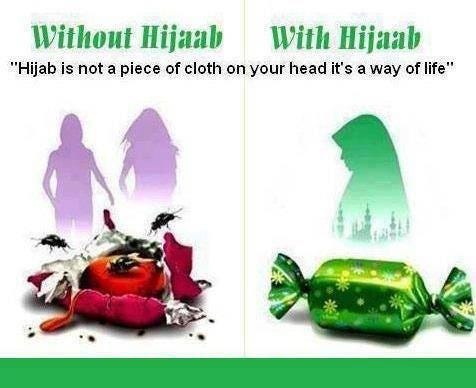
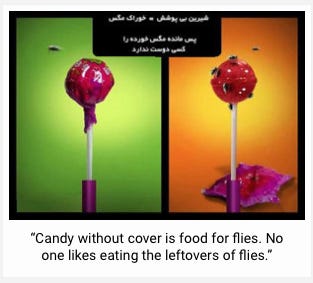

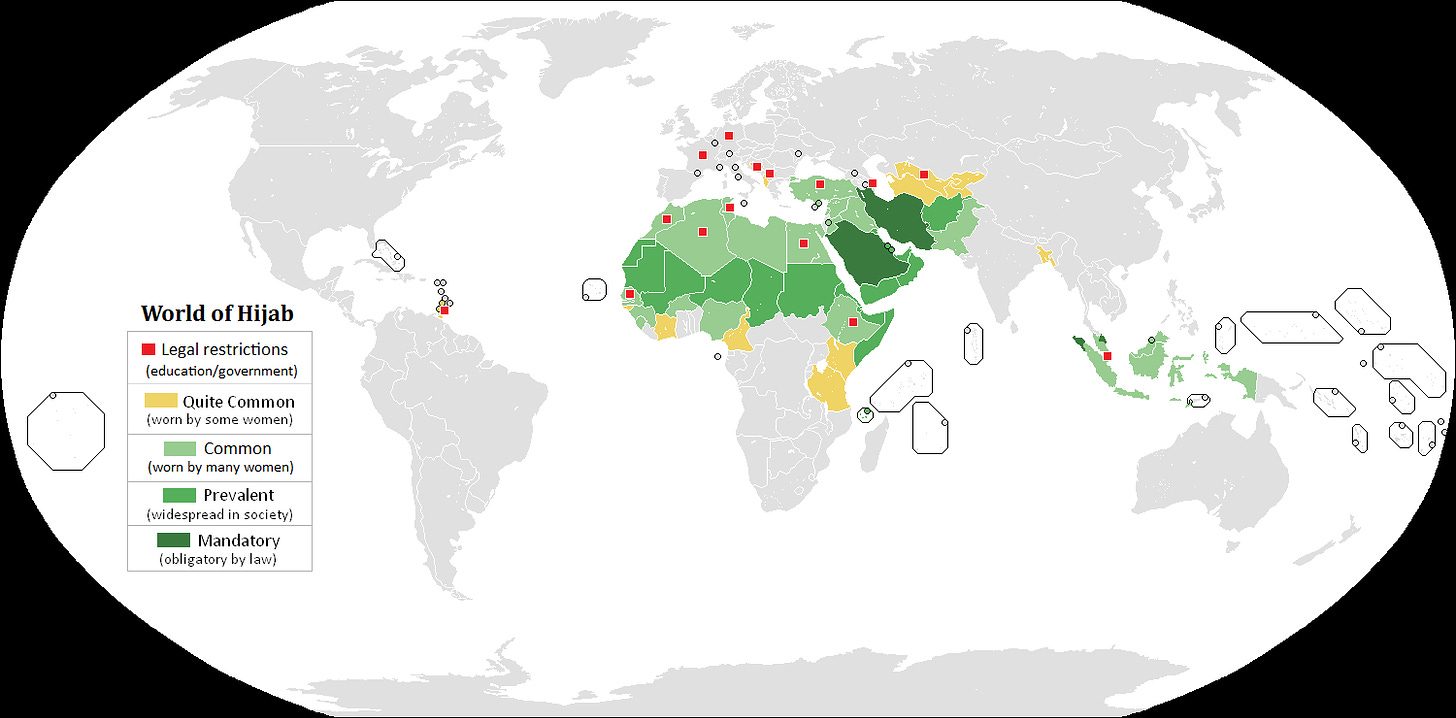
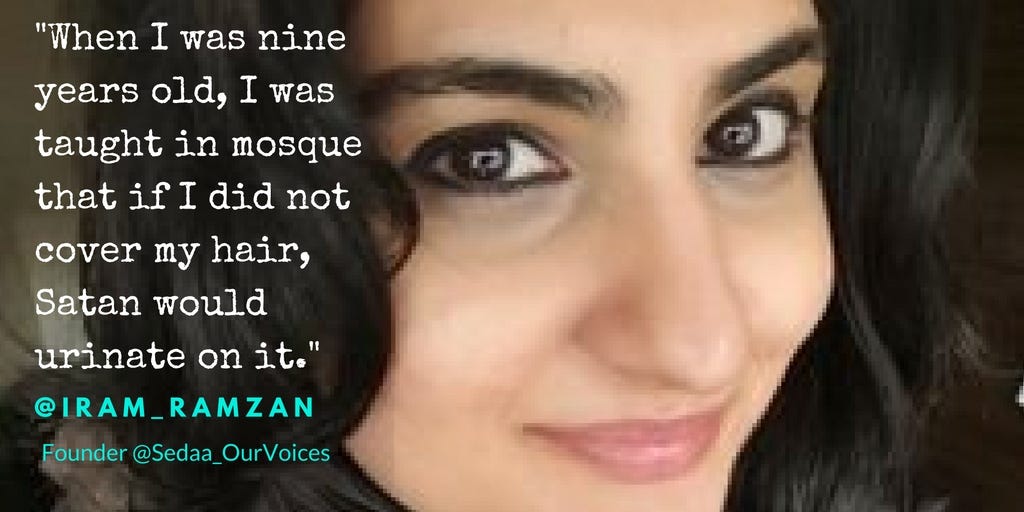


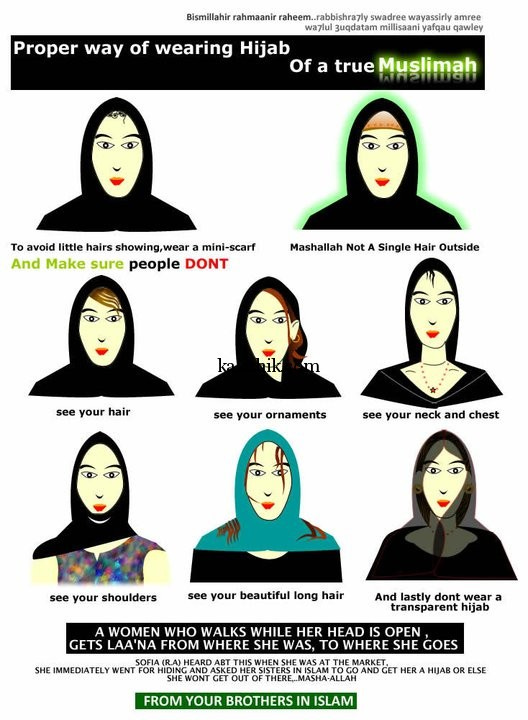
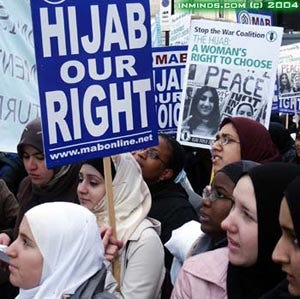
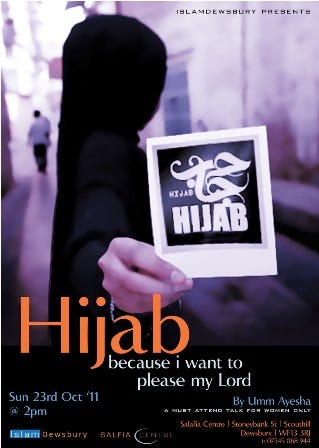

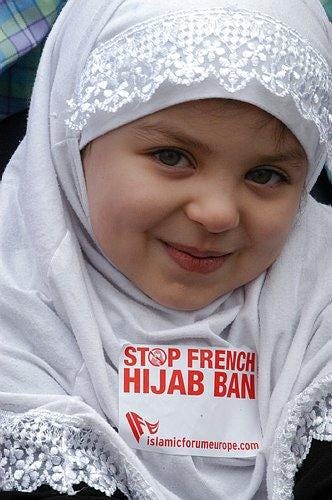
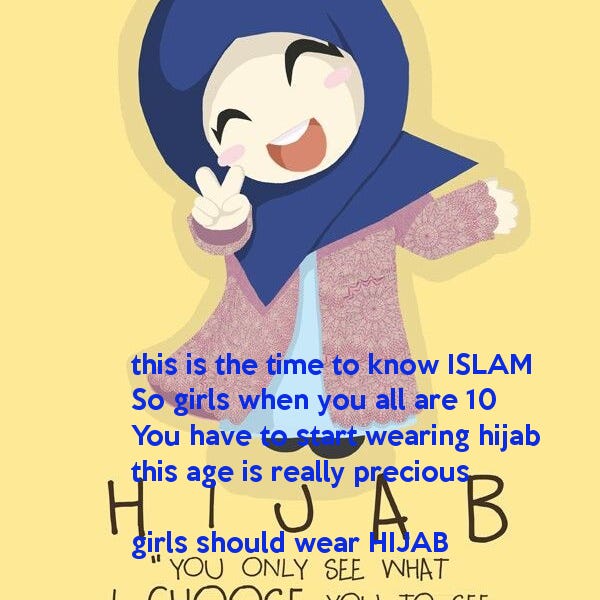

Wow this is fantastic. I have a daughter and want her to have the same opportunities and treatment for her as I get. Recently saw a report on how masks, head covers etc are a form of control. Gee go figure men controlling women say it isn’t so. Should be a choice not forced and an excuse to oppress. As someone who speaks another language your analysis on how words can be interpreted (screen or curtain vs headcover) totally makes sense. The concept of separation (evil from good etc) is also found in other religions as well. Great stuff here.
memorizing Surah Fatihah is an important religious duty for Muslims, and it can benefit individuals in many ways. With the help of online platforms, memorizing Surah Fatihah has become more accessible and convenient. Online platforms offer a variety of learning materials, can enhance the learner's understanding of the chapter, provide a supportive learning environment, improve memorization skills, have a positive impact on mental health, and help individuals to connect with their culture and heritage. https://meriweb.net/quran/surah-maryam/